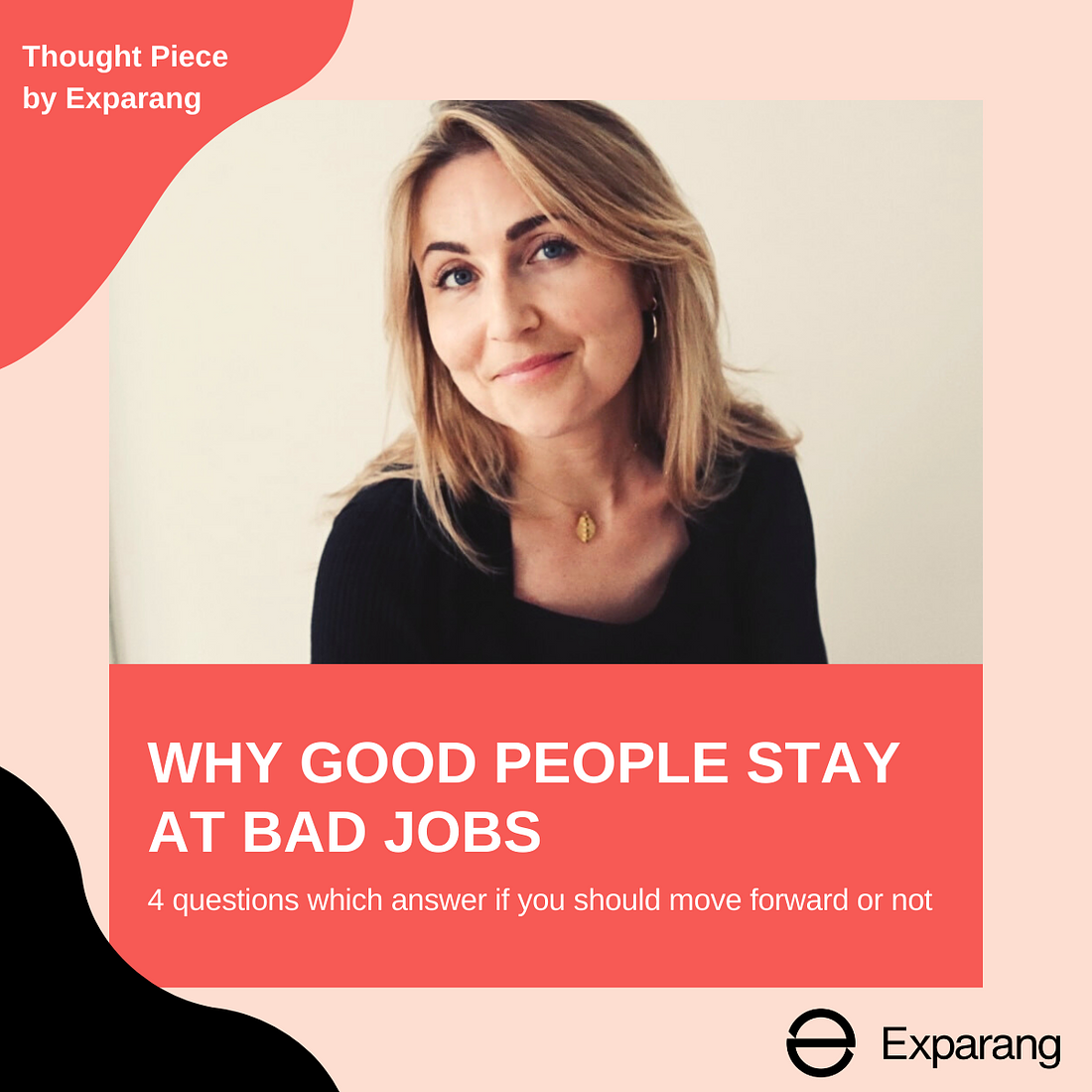Why good people stay at bad jobs
4 questions which answer if you should move forward or not

Life choices include but are not limited to: breaking up with a partner, not having or having a baby, relocate to the suburbs, changing jobs. Sometimes they are less of a choice or not even ours to make, they sort of unfold without our consent and you simply must accept and deal. However, when you are in charge of decision-making, which we usually are when it comes to career and job changes, there is no reason to be passive. Make a habit of asking yourself these questions at least twice a year to make sure you are not stagnating in a flat and dull job situation when you could actually be moving forward to something amazing.
What exactly are you waiting for?
“They promised me a promotion, this time it will happen, once the fifth reorganization is done…” At most functional workplaces, each employee has a development plan. A roadmap that guides them to the next destination with a few marked milestones along the way. Sure, it’s the nature of plans to change, but when you find yourself waiting too long for that promised promotion/ project approval/ country relocation it’s time to be honest with yourself – what’s the likelihood of it ever happening? Furthermore, say you get that promotion (after being leapfrogged by all your colleagues) how long will that new role keep you motivated when it’s already way overdone? Basically, how long is your goal worth waiting for?
Is the “work life balance” your preferred balance?
No two people perceive the balance between work versus private life exactly the same, simply because we value different things in life. That is why the term “work life balance” should be fleshed out and defined in every company culture. Most commonly, we tend to react negatively to cultures where work overrules private life. That’s when people experience burn out, and if you are dealing with anything close to it - get out asap. But it’s equally important to reflect on the opposite – when you don’t have enough to do at work, and the few tasks on your daily agenda are manageable while briefly napping. The half day vacation mode might seem attractive at first, but it’s not where you will learn and thrive, or be the happiest, most stimulated you in the long run.
Do you stay because “it’s the right thing to do”?
We tend to think we are irreplaceable. No one can do what we do. Who would pick up the super complex email conversation if you left? Your boss would be disappointed, your colleagues would burn out from all the extra work you’ll dump in their lap and come to think about it - the entire company would probably collapse. It is best to stay, for the sake of others. Making decisions based on how we value duty, accountability and responsibility might be noble. But decision-making that concerns where you spend the vast part of your awake time should probably be based on more joyful and purposeful values.
Where do you see yourself in one, five and ten years’ time?
To most people this question is overwhelming. Who knows where or who they want to be in five or ten years? Instead, consider the opposite, would you be satisfied if you found yourself in the same place you are today, five years from now? Or even in two? If the answer leans towards “no”, you need to act and start screening the market for something new. Waiting until a situation becomes unbearable is rarely the best motivation to find a new opportunity. The common saying “it’s better to move towards something than away from something else”, is a cliché for a good reason – it’s true. The awareness of what you don’t want to do is often a better catalyst towards change, than staying put until you know the exact plan forward, listen to it.
Big or small decisions - letting go of the old is difficult but also how to keep life fresh and allowing purpose to change over time. The worst that can happen is that the new role isn’t exactly what you’d expected, and in that case you give yourself credit for daring, appreciate what you learned and keep moving forward. And in the best case, what comes next will be marvelous.
Hedvig Öster — Talent & Communication Advisor at Exparang
About Exparang.
Exparang opens doors for personalised career opportunities and unbiased candidate sourcing in the global market for board, executive and other high impact positions.
We are an innovative HR-Tech company that is reengineering the executive search process with a modern AI-enabled platform for exceptional data driven recruitment matches. The interactive matching is instant, unbiased and based on strong mutual interest.
Become a member of Exparang here
We help our anonymised members, leaders and seasoned professionals, to further their careers with timely access to personalised opportunities, continuously and discreetly. We open doors to fulfilling careers.
About Hedvig Öster.
Hedvig works as writer and consultant to Exparang and is the founder and CEO of People Equity, a strategy and communication consultancy helping companies with Diversity, Equity & Inclusion, Talent Management, communication and recruitment strategy, workshops and talks as well as leadership and career coaching.
